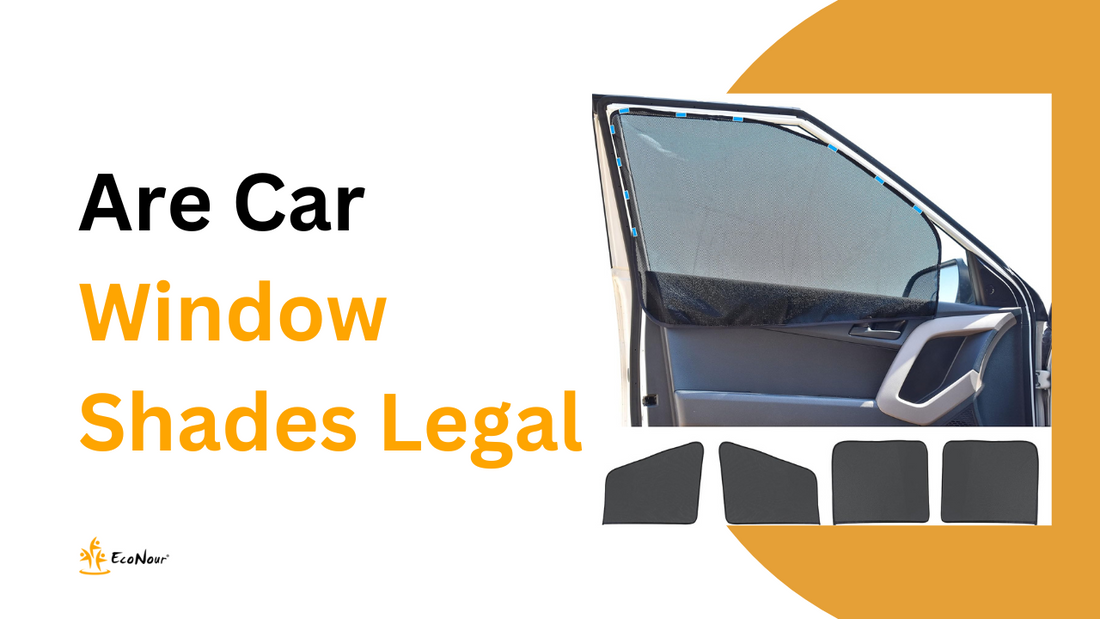
Are Car Window Shades Legal?
Share
Car window shades, including car window sunshades, window shades for cars, auto side window sunshades, and car side window blinds, have become increasingly popular as drivers seek ways to protect themselves from the sun's harsh rays. However, these accessories often fall under strict legal scrutiny due to safety concerns. This blog aims to clarify whether using car window shades is legal and provide you with practical alternatives that comply with the law.
Understanding Car Window Shade Regulations
Car window shade regulations differ from one country or state to another. The main concern is whether these shades obstruct the driver's view or interfere with law enforcement's ability to see inside the vehicle. Most laws focus on the level of transparency, measured by Visual Light Transmission (VLT), that these shades offer.
In general, car side window shades must allow a certain percentage of light to pass through, typically ranging from 30% to 70% VLT, depending on the region. For example, in the United States, the federal law requires that the front windshield must allow more than 70% of light in, while the side windows can have a slightly lower VLT. In contrast, some countries like the UK have specific regulations for front, rear, and side windows, which must be adhered to strictly.

Legality of Car Window Shades by Region
The legality of using window shades for car varies significantly by region. Here's a breakdown:
- United States: In most states, front-side windows must allow more than 70% of light in, while rear-side windows and the back windshield may have darker tints. However, local laws vary, so it's important to check state-specific regulations.
- Canada: Similar to the U.S., Canada has strict regulations on the amount of light that must be allowed through front-side windows. The requirements for rear windows are more relaxed.
- United Kingdom: The UK law states that the front windshield must let in at least 75% of light, and the front side windows must let in at least 70%. The rear windows have no specific VLT requirements.
- Australia: Australia has stringent laws, with most states requiring a minimum of 35% VLT for side windows and 70% for the front windshield.
- India: In India, the Supreme Court banned all sun films for cars in 2012, allowing only factory-fitted tinted glass that complies with specific VLT percentages (70% for front and rear windshields, 50% for side windows).
Penalties for Illegal Use of Car Window Shades
Failure to comply with window shade regulations can result in fines, penalties, or even the suspension of your vehicle's registration. In many regions, law enforcement officers have the authority to issue citations if your window shades are found to be non-compliant.
For example:
- United States: Penalties can range from $100 to $200 for the first offense, with increasing fines for subsequent violations.
- India: The fine for using illegal window tints can be as high as ₹300, with repeat offenders facing more severe penalties, including license suspension.
- United Kingdom: Fines can range from £100 to £200, and non-compliant vehicles may fail their MOT test.
Alternatives to Car Window Shades
For those looking to reduce heat and glare without running afoul of the law, several alternatives to tinted windows are available:
Detachable Sun Shades: These shades can be attached to the inside of your car windows and easily removed when not needed. They provide protection from UV rays without altering the window's VLT.
Retractable Sun Shades: Similar to detachable shades, these can be rolled up or down as needed, offering flexibility and compliance with legal standards
UV-Protective Films: Some clear films offer UV protection without significantly reducing visibility. These are often legal and provide a good balance between sun protection and compliance.
Factory-Tinted Windows: Many manufacturers offer factory-tinted windows that meet legal requirements. These are typically a safer option as they are designed to comply with regional laws.

Impact of Window Shades on Insurance
Using illegal car window shades can affect your insurance coverage. In some cases, if your vehicle is involved in an accident and it is found that your window sun shades for car were non-compliant, your insurance claim may be denied. Therefore, it's essential to ensure that any modifications to your vehicle, including window shades, adhere to the legal requirements.
How to Ensure Compliance with Window Shade Laws
To avoid penalties and ensure your vehicle is road-legal, follow these steps:
- Research Local Laws: Always check the specific regulations in your region before installing any window shades.
- Consult Professionals: If you're unsure about the legality of your window shades, consult with a professional installer who is familiar with local regulations.
- Regular Inspections: Periodically check the condition and transparency of your window shades to ensure they haven't degraded and fallen out of compliance.
Conclusion
While car window shades offer numerous benefits, including protection from UV rays and increased privacy, it is crucial to understand and comply with the legal requirements in your area. By choosing the right type of sun shade or alternative and staying informed about local regulations, you can enjoy the benefits of car window shades without risking fines or penalties.
